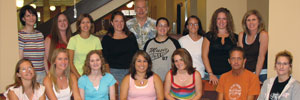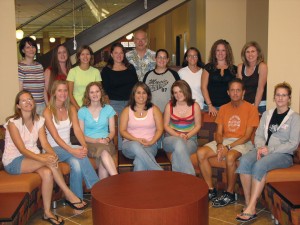
West Nile survivor Brandon Hill says it’s all about giving back
‘Blessed in my recovery’
Hill spent 62 days in the Via Christi Hospital’s Neurocritical Care Unit fighting for his life. He was on a ventilator for five weeks with a collapsed lung, during which time he was fed through a tube and had no solid food or drink.
When he was released from critical care, he spent the next 10 days undergoing therapy at the Via Christi Rehabilitation Hospital. That was followed by four months of outpatient physical therapy.
Hill saw an occupational therapist Mondays, Wednesdays and Fridays, and located a physical therapist who offered his services pro bono on Thursdays and Fridays. He also saw a chiropractor who worked with him pro bono two days a week.
“I was blessed in my recovery,” Hill said. “I had therapy pretty much every day, five days a week.”
Even so, it took Hill three months to learn how to hold his head up, and five months to be able to feed and dress himself. It would be almost a year before he could raise his right arm above his head.
Because of his experience, Hill developed a strong desire to go into health care, so that he could help others as he had been helped. In 2004 he became a national certified massage therapist, to strengthen his arms. A few years later, he heard about the OTA program that was about to be started at Newman University.

Brandon Hill was the only male in the first class of the Newman OTA program.
The Newman program is the only one in Kansas designed to train OTAs, who work under the supervision of occupational therapists to help individuals regain, adapt to or compensate for impaired physical abilities. With some financial assistance from Via Christi, Hill enrolled in the university’s first OTA class in January 2007.
Hill said his college experience at Newman was different than at previous institutions.
“It was excellent,” he said. “The size of the classes allowed you to get personal attention. The schedule was pretty flexible and had evening classes, so I was able to work full time all through school. All of the OT staff were always helpful, and even the professors I had for religion and philosophy and other electives were all great.
“I was always inspired by the environment at Newman to do my best. I’ve gone to many other colleges. None of them ever had the atmosphere of Newman.”

Clint Stucky, MS, MSEd, OTR/L
When Hill graduated in December 2008, he was a 4.0 honor student, a member of the national Pi Gamma Mu honor society, president of the Occupational Therapy Student Association, and the first recipient of the Newman OTA Program’s Outstanding Student Award.
In presenting the award, Director of the Occupational Therapy Program Clint Stucky, MS, MSEd, OTR/L, said Hill, “exemplifies the principles and values embodied in the program’s Mission Statement, among them a commitment to life-long learning, respect for the dignity of all people, compassion for those less fortunate, and service to the profession.”
Miracles almost daily
Today, Hill and his wife Julie live in Wichita with his 20-year-old-son Jordyn, his 16-year-old stepdaughter Jordan (yes, he said, it does get a little confusing), and his 12-year-old stepson Jarrett.
He began working at Via Christi in October 2009, and helps treat patients in all areas, including the burn center, surgical intensive care, general medical floor, orthopedics, and as needed at the Via Christi Rehabilitation Hospital.
The youngest patient he has seen was 9 years old; the oldest was 98.
Hill said he is considering pursuing a master’s degree to become a registered occupational therapist, but he’s not sure it’s for him because, as he put it, “They work with paper, I work with patients.”
What is certain is Hill’s devotion to helping others.
“If I didn’t have bills to pay I’d still work this job — for free,” he said. “I do it because of the impact it has on people’s lives. I see miracles happen almost daily.”
Hill described a recent patient, a 16-year-old girl. Her car hit a light pole and the electric transformer on the pole fell on the car.
“She had second- and third-degree burns all over her body,” Hill said. “When I raised her arm to work on her range of motion, her blood pressure would crash. Her vitals were very unstable. I worked with her in the burn center for three months, then at the rehabilitation center, and by time she left we were playing ping-pong. To see progress like that, there’s no better reward.”
Tags: Barton County Community College, Brandon Hill, Clint Stucky, Encephalitis, Great Bend, Kansas, Kansas City Kansas Community College, Kansas State University, Labor Day, Meningitis, Neurocritical Care Unit, Occupational Therapy Assistant, Occupational Therapy Student Association, Outstanding Student Award, ping-pong, Rae Lyn Mefford, Via Christi Health, Via Christi Hospital, Via Christi Rehabilitation Hospital, West Nile Virus
